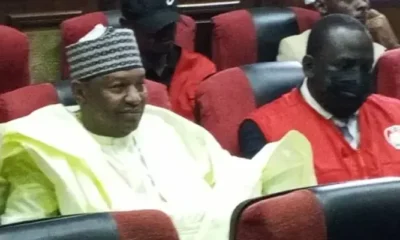Business
Nigeria Loses Over N6tn Revenue Generation To Tax Waivers Annually
Tax reform committee views this as a major area of concentration and is examining each incentive…

Taiwo Oyedele, the Chairman of the Presidential Committee on Tax and Fiscal Policy Reform, expressed apprehension on Friday concerning the losses to the nation of up to N6 trillion annually through tax abatements, which is almost the same amount it accrues in revenue.
VerseNews reports that Oyedele confirmed, on Channels Television’s Sunrise Daily, the figure recently quoted by the Senate regarding tax waivers.
He said, “Yes, as a matter of fact, we are giving away about N6 trillion annually.”
The financial expert confessed that the country had not calculated the result of such extensive tax exemptions on the economy when asked to talk about its monetary viability.
“This is really the part that makes it painful because it would then appear like you just wasted the money you didn’t even have in the first place, and those numbers are huge compared to our revenue base.
“If we were a country where we’re making N60, N70 trillion and we gave away, maybe we would say, ‘We can live with it.’ But the revenue generated by the FIRS in 2021 — the year before the last — was just barely N6 trillion. And then you give that away in tax waivers and incentives.”
However, the Chair of the Tax Reform Committee highlighted the significance of excluding from the Value-Added Tax (VAT) essential items such as basic foodstuffs and medical expenditure.
“Like now, I’ve requested that government suspend VAT on diesel for very obvious reasons as well as suspend VAT on import duties [and] CNG. There are things you have to do par time because, at the end of the day, governance is about the people,” he said.
“You may not be able to immediately measure the economic impact on those ones, but you, of course, can tell the social impact.”
Oyedele stated that if no interventions were made, the country might be in danger of ‘erupting with disastrous consequences,’ and citizens would be out on the streets if their lives became unbearable and the government appeared desensitized.
“Having said that, the other waivers, whether those waivers are to do with income tax exemptions, duty and VAT waivers for some businesses, even the Free Trade Zone Area, where people can operate physically within Nigeria but, by law, we would assume that they are not within Nigeria and then they get all manner of waivers from duties to VAT and income tax,” he said.
He stated that the tax reform committee views this as a major area of concentration and is examining each incentive separately and in detail.
“[We are] asking ourselves, ‘If we were going to design a new incentive regime for Nigeria today, will this qualify? On what basis? How can you ensure that it’s targeted? How can you measure the impact on the economy?’ he noted.
Oyedele said as much as possible, the committee is building “sunset provisions” into those incentives, explaining that one might find that a policy that is beneficial to the nation’s economic circumstances in 2023 could be irrelevant in two years or less.
“But it could also be maybe another five or 10 years. But whatever it is, we will be using data and engagement with stakeholders to decide and design, ‘How long do we need the incentive for?’ and put those subset clauses in the law, so that it wouldn’t be another 20 years before we realise that we’ve been losing money for so many years in the past, as we have seen historically,” he said.
























You must be logged in to post a comment Login